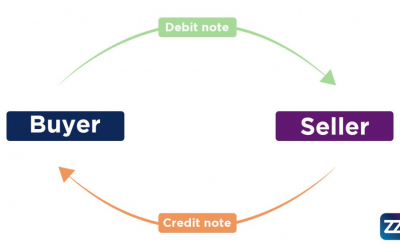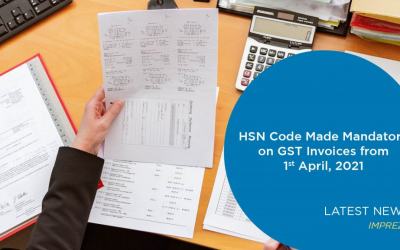 The Goods and Service Tax (GST); a new taxation system in India, has replaced many of the existing indirect taxes. The complicated GST invoice format of the asset-based tax system is now eliminated under GST, a destination-based tax system. It has replaced several indirect taxes that include, Taxes, VAT, CVD (Counter Veiling Duty), Excise Duty, Entry Tax, SAD, Purchase Tax, etc. The Central Government of India has so far enacted four types of GST Invoice format, namely, CGST, IGST, UTGST, and bills of compensating states that are implemented in the whole nation.
The Goods and Service Tax (GST); a new taxation system in India, has replaced many of the existing indirect taxes. The complicated GST invoice format of the asset-based tax system is now eliminated under GST, a destination-based tax system. It has replaced several indirect taxes that include, Taxes, VAT, CVD (Counter Veiling Duty), Excise Duty, Entry Tax, SAD, Purchase Tax, etc. The Central Government of India has so far enacted four types of GST Invoice format, namely, CGST, IGST, UTGST, and bills of compensating states that are implemented in the whole nation.
The well-structured GST regime has eliminated the cascading effects and double taxation, along with facilitating the smooth functionalities of business operations. Since its inception, India’s GST tax regime has increasingly registered growth and government revenue, affecting both the manufacturing and service sectors. However, India is a country that has regulated, partially regulated, and unregulated sectors that are continuously monitored. To counter these issues, the government has introduced the Reverse Charge Mechanism (RCM).
RCM strives to improve compliance procedures and tax coverage. Previously, the reverse charge concept was only meant for service taxes and applied to services sold and not for goods. Later, under the GST Act, the government notified specific goods and services on which reverse charge GST is applicable. In this article, you will learn more about RCM, rules, Self-invoicing, RCM GST invoice format, RCM GST tax invoice software, and other necessary fields of reverse charge mechanism.
What is Reverse Charge Mechanism Under GST?
Usually, under GST, the supplier is liable to collect tax on the goods and services offered. The reverse charge mechanism is a new concept introduced by the central government. The recipient is eligible for the Input Tax Credit on the product or the service received on behalf of an unregistered minor supplier. The RCM GST system aims to expand the base of taxes acquired in the nation. It also strives to provide compensation for the state’s loss of revenue.
Any person obligated to pay the tax on reverse charges must adhere to specific provisions such as threshold exemption, time of supply, and input tax credit changes. There is a minimum total turnover of RS 20,00,000 required to register as regular taxpayers, but there is no such limit in the case of reverse charges. A person must be registered under GST regardless of the total limit.
Reverse Charge Mechanism under GST is applicable under the following circumstances:
- It is applicable when an unregistered supplier supplies goods or services to a registered dealer.
- It applies to the services provided by an e-commerce operator.
- It is also applicable to the supply of services and goods specified by the CBIC.
Specified Rules Under RCM
Rule – 1
Businesses or individuals who are liable to pay taxes under RCM must register themselves as a certified taxpayer even though the annual turnover is below the minimum tax pay limit.
Rule – 2
The tax application under RCM must be submitted to the government on the 20th of every month.
Rule – 3
The recipient liable to pay RCM can avail of the credits of ITC if the business or individual is registered under the reverse charge mechanism GST.
Rule – 4
Taxpayers registered under RCM are required to present the manually updated invoice or payment voucher details to avail of the tax credits or advantages if the crucial information in an auto-populated invoice is absent.
Rule – 5
Taxpayers can avail of tax credits under RCM even in case of advance payments.
Rule – 6
Enterprises with an annual turnover of lesser than ten crores can be omitted under RCM.
Rule – 7
Under RCM, a recipient can avail of tax credits only on the supplies issued by a business or a company.
Self – Invoicing Under RCM
Self-invoicing or billing is done when a registered taxpayer purchases goods or services subjected to RCM from an unregistered vendor. Self-invoicing is crucial as the supplier cannot issue a GST compliant invoice to the buyer. Therefore, the recipient is responsible for paying taxes on behalf of the vendor.
Payment Voucher Format or GST Invoice Format Under RCM
The payment voucher or invoice under RCM acts as proof of payment under GST. It is the evidence of the transaction carried out between a taxpayer and an unregistered supplier. Thus, the recipient’s responsibility is to create invoices or produce proof of payment/payment voucher on the goods or services received. Accordingly, a payment voucher or the RCM invoice format under GST is issued upon the payment of the supplies delivered.
Under CGST Act 2017, Section 31 (3) (g), a registered recipient must issue a payment voucher/RCM invoice to the supplier while making payments for goods or services on which reverse charges are applicable. A payment voucher/GST invoice format under RCM should include essential details as specified by the CBIC.
Necessary Fields of Payment Voucher/GST Invoice Format Under RCM
- Name and address of the goods and services provider.
- A consecutive serial number that does not exceed 16 characters. The combination must be unique from that of other fiscal year combinations.
- The date on which payment voucher or RCM invoice is issued.
- Name, address, and GSTIN number of the recipient.
- Description of goods and services on which reverse charge tax is paid under GST.
- The total payment processed to the supplier.
- Rate and amount of tax charged under different clauses CGST, SGST / UTGST, IGST, and cess.
- The place of supply, state name, and code for transactions carried out on interstate supply of goods or services.
- Digital or manual signature of the supplier or an authorized representative of the supplier.
RCM GST Invoice Software & Features
Although certain small businesses have determined chartered accountants to manage financial accounting operations, it is vital to implement RCM billing and invoicing software. It simplifies the whole process that helps streamline other business operations effectively. Here are some of the significant features that you must look for in the RCM GST accounting software.
- The robust technology of ERP helps eradicate the manual errors that occur while filing and formatting the invoices.
- Your RCM GST invoice generator must be compatible and updated as per the central government’ guidelines of e-invoicing.
- The GST invoicing software simplifies the procedures of GST returns filing.
- The cloud-based GST billing software offers data privacy and security that are significant to manage finances and accounting details.
- An ideal software enables businesses to handle complex tasks such as GST tax calculations, tax rates, deductions, timely returns filing, formatting necessary invoice details, etc.
Conclusion
The GST tax regime in India has been in practice for almost a decade now. However, the ongoing COVID-19 economic crisis has stirred confusion due to several changes in the nation’s taxation policies, GST rules, and regulations. The changes in tax calculation aim to ease the burden of taxpayers alongside increasing the tax revenue generation. The simple solution amid the tough time for both government and the taxpayers is the e-invoicing/business software solutions.
The core value of accounting software strives to solve the problems concerning GST invoice format and bills. It is the one-step solution to all misinterpretations and manual errors of invoice computation. Imprezz is one such business intelligence software that helps create GST invoices, manage inventory, purchase orders, track purchases, and file returns directly on the GST portal in just a few clicks. It is the pioneer of small business accounting software in India that is trusted by thousands of accounting experts nationwide.
We offer a 14 days free trial software program for CA’s, freelancers, solopreneurs, and small businesses in India. Login in less than 2 minutes to get started right away!


